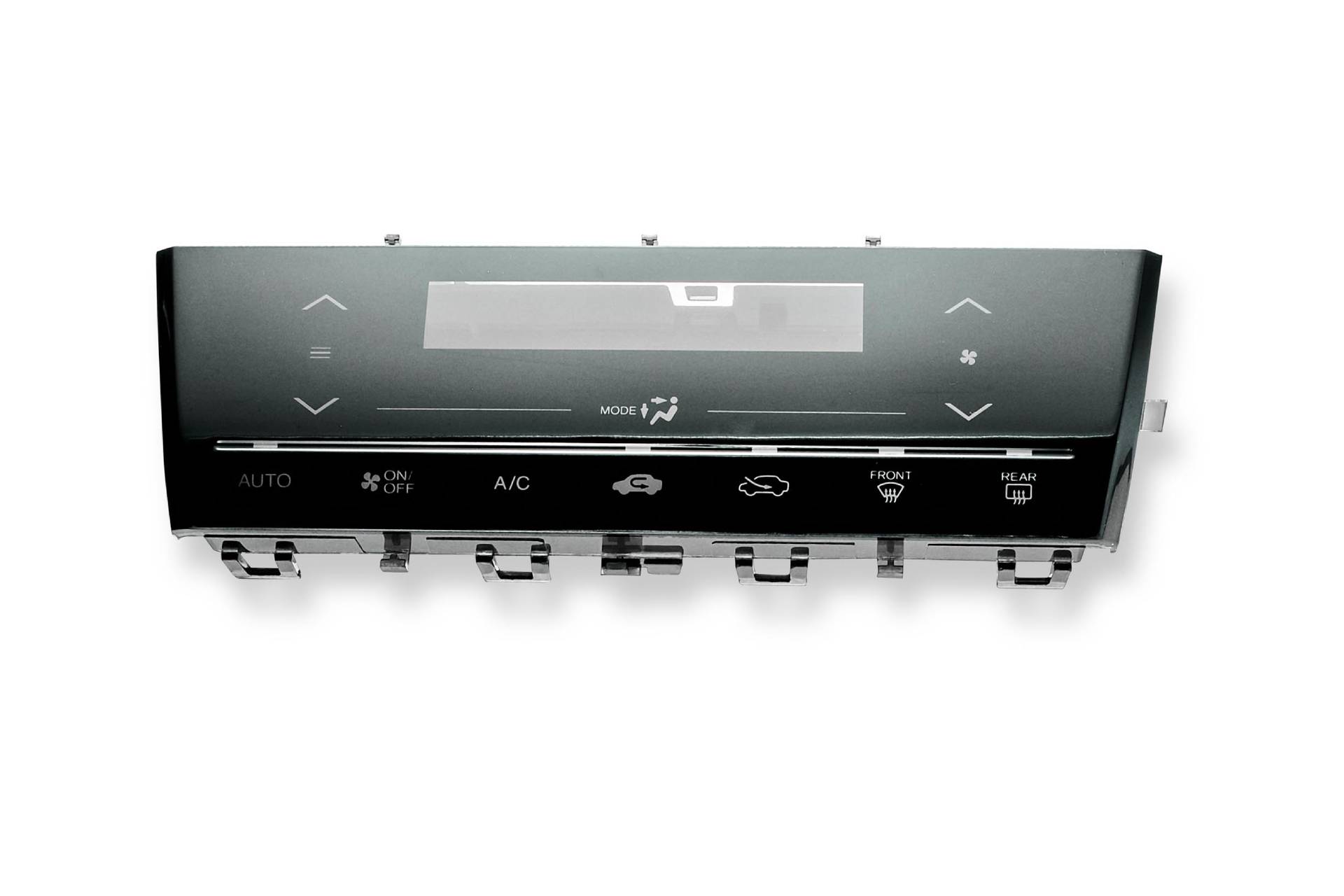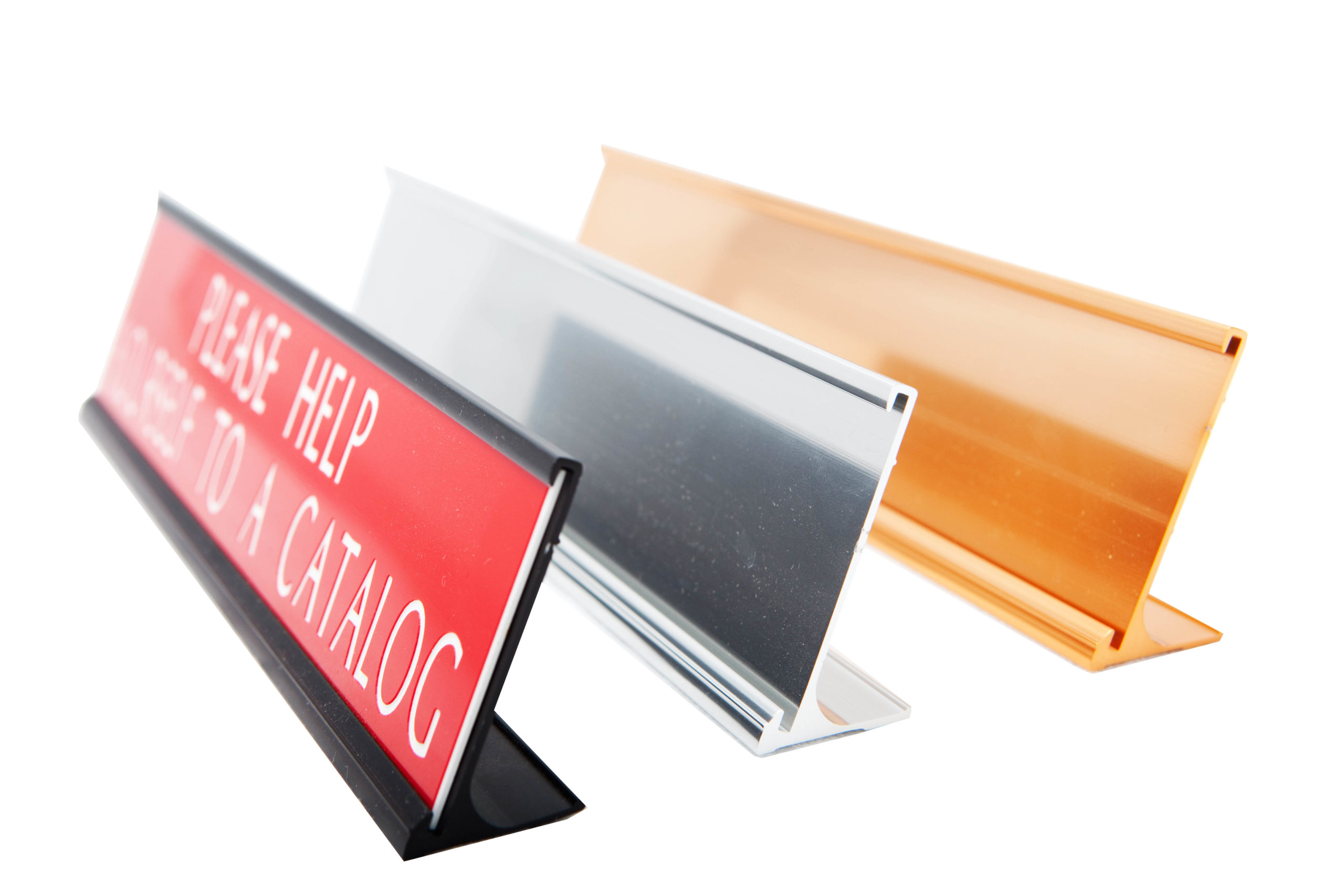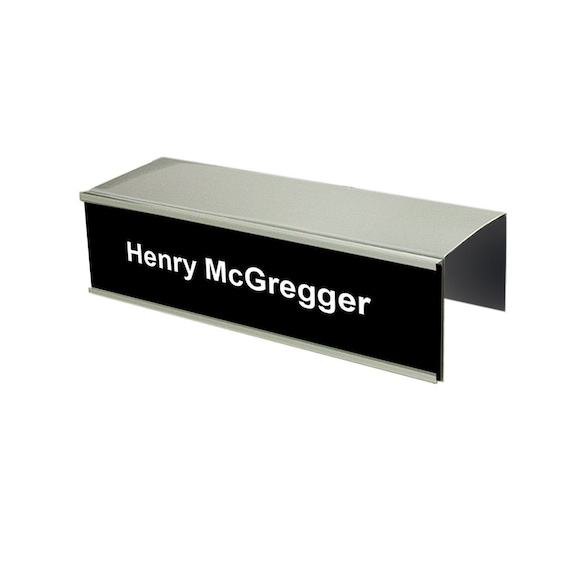The Evolution of Plastic Nameplates in Industrial Labeling Solutions
The Evolution of Plastic Nameplates in Industrial Labeling Solutions
Blog Article
Just How Plastic Nameplates Are Produced: A Comprehensive Overview to Their Manufacturing Refine
The manufacturing of plastic nameplates includes a number of accurate steps, beginning from the selection of appropriate products to the final complements. Each phase is crucial, making certain the item fulfills particular needs for longevity and visual appeals. Numerous manufacturing techniques play a substantial duty in crafting these nameplates. Comprehending these procedures can clarify the complexities behind what may appear like a simple item. What aspects add to the quality and personalization of these nameplates?
Understanding Plastic Products Used for Nameplates

The Style Process: From Idea to Model
The design procedure for plastic nameplates starts with a clear principle that overviews the total development. Developers collaborate with clients to define the objective, style, and certain requirements of the nameplate. This initial phase consists of brainstorming sessions, laying out ideas, and picking colors and fonts that align with branding goals.Once the idea is established, developers utilize computer-aided layout (CAD) software application to develop thorough electronic representations. These models permit visualization and modifications before moving on. Comments from stakeholders is important during this phase, as it aids fine-tune the style to fulfill expectations.After finalizing the digital model, a physical version may be produced, typically with methods like 3D printing. This tangible depiction enables further examination of looks and functionality. Generally, the design procedure is an important action that lays the foundation for the efficient manufacturing of high-quality plastic nameplates.
Reducing and Forming the Plastic
In the cutting and shaping phase of plastic nameplate manufacturing, the selection of products plays an essential duty in figuring out the final item's quality and toughness (Plastic Nameplates). Numerous precision cutting strategies, such as laser cutting and CNC machining, warranty that the plastic is shaped with accuracy and uniformity. This combination of cautious product choice and advanced cutting approaches is essential for creating top quality nameplates

Material Choice Process
Selecting the right product is crucial for creating top quality plastic nameplates. Various types of plastics are available, each offering distinct benefits and attributes. Common options consist of acrylic, polycarbonate, and PVC. Acrylic is preferred for its clarity and UV resistance, making it suitable for outdoor applications. Polycarbonate, recognized for its resilience and effect resistance, is suitable for settings that need boosted protection. PVC is commonly selected for its cost-effectiveness and adaptability in style. The selection procedure likewise thinks about variables such as thickness, surface, and color coating, which can considerably affect the last look and performance of the nameplate. Eventually, the picked material must line up with the meant use and aesthetic objectives of the plastic nameplate.
Accuracy Trimming Strategies
While picking the suitable material prepares, precision cutting methods play a vital function fit the plastic nameplates right into their last forms. Various methods, including laser cutting, CNC milling, and die reducing, are employed to attain precision and uniformity. Laser cutting uses concentrated light to create clean edges and complex styles, suitable for complex patterns. CNC milling uses adaptability by removing excess product with precision, accommodating various densities and shapes. Die cutting, on the various other hand, enables mass production of uniform pieces, enhancing performance. Each method is chosen based on the layout specs and the desired surface, making sure that the end product fulfills top quality criteria and client assumptions while keeping resilience and aesthetic allure.
Printing Techniques for Customization
How can manufacturers achieve exact and vibrant layouts on plastic nameplates? The solution hinges on various printing strategies tailored for personalization. Digital printing has acquired popularity as a result of its ability to produce high-resolution images and complex styles straight onto plastic surfaces. This technique enables fast turn-around times and marginal configuration costs, making it perfect for short runs and individualized orders.Screen printing remains one more extensively made use of technique, specifically for bigger quantities. It involves developing a stencil and using layers of ink, resulting in rich colors and resilience. UV printing, which uses ultraviolet light to treat the ink, is also effective, providing exceptional bond and resistance to fading.Additionally, pad printing offers versatility for irregularly designed nameplates, enabling in-depth styles on challenging surface areas. These printing methods make it possible for producers to fulfill varied customer requires while making sure high quality and long life in their plastic nameplate products.
Surface Area Therapies and Finishing Options

Quality Control Actions in Production
Ensuring the greatest requirements of quality assurance throughout the production of plastic nameplates is necessary for preserving item integrity and consumer complete satisfaction. Producers implement extensive assessment methods at numerous phases of the manufacturing process. Originally, resources go through detailed screening to validate they fulfill specs for longevity and color uniformity. During the molding stage, automated systems keep an eye on specifications such as temperature and stress to stop defects.In addition, visual examinations are carried out to identify any surface imperfections or misalignments. When the nameplates are produced, they undergo practical examinations, including adhesion examinations for printed components and cardiovascular test for longevity. Quality assurance teams commonly employ statistical sampling methods to evaluate batches, making certain that any kind of discrepancies from standards are promptly resolved. This detailed strategy not just improves product high quality but additionally cultivates count on with customers, attesting the supplier's dedication to excellence in every nameplate produced.
Product packaging and Distribution of Finished Nameplates
The product packaging and circulation of finished plastic nameplates are vital steps in ensuring they get to clients in perfect condition. Different packaging products are selected to protect the nameplates throughout transportation, while delivering approaches are very carefully picked based upon performance and cost-effectiveness. Furthermore, efficient storage space options are executed to maintain quality till the nameplates are supplied.
Packaging Materials Made Use Of
Choosing appropriate packaging materials is vital to assure their defense during transit when dispersing ended up plastic nameplates. Generally utilized products consist of bubble wrap, foam extra padding, and cardboard boxes, all made to support the nameplates versus shocks and effects. Bubble wrap provides a flexible barrier, while foam extra padding warranties that nameplates stay securely in position, minimizing the see this here danger of scrapes or breakage. In addition, strong cardboard boxes are made use of to have the nameplates, offering architectural assistance and defense from outside elements. Labels might be put on show taking care of directions or breakable components, even more boosting security throughout transportation. Generally, making use of premium product packaging materials considerably contributes to the integrity and presentation of the finished plastic nameplates upon arrival at their location.
Shipping Techniques Used
Effective distribution of finished plastic nameplates relies upon numerous shipping methods that guarantee timely and safe and secure distribution. Firms often use messenger solutions, products shipping, and postal services, relying on the size, weight, and destination of the bundles. For local shipments, copyright services offer quick transportation, making sure nameplates reach consumers promptly. For larger orders, freight delivery is liked, making use of trucks or delivery containers to carry mass quantities efficiently. Post offices function as an economical alternative for smaller sized shipments, specifically for domestic deliveries. All delivery approaches focus on safety packaging to stop damages throughout transit. Tracking systems are likewise used to check shipments, supplying customers with real-time updates and reassurance pertaining to the standing of their orders.
Storage Solutions Implemented

Regularly Asked Questions
What Kinds of Services Commonly Use Plastic Nameplates?
Plastic nameplates are typically used by numerous companies, including offices, manufacturing facilities, institutions, and medical facilities. These nameplates offer necessary functions such as recognition, info display, and branding, adding to organizational effectiveness and professional look across diverse environments.
For how long Does the Entire Manufacturing Refine Take?
The production procedure period differs based upon intricacy and amount, commonly ranging from a couple of days to numerous weeks. Factors affecting this timeline consist of design approval, material schedule, and manufacturing methods utilized by the business.
Can Plastic Nameplates Be Recycled After Use?
Plastic nameplates can be recycled, supplied they are made from recyclable products. However, the accessibility of reusing programs and regional regulations may impact their recyclability. Proper disposal techniques are important to ensure reliable recycling.
What Are the Ecological Influences of Plastic Nameplate Manufacturing?
The ecological impacts of plastic nameplate manufacturing consist of carbon exhausts, source depletion, and contamination from producing procedures. Plastic Nameplates. In addition, improper disposal adds to plastic waste, negatively affecting environments and wild animals, highlighting the requirement for lasting practices
Are There Any Safety Issues With Plastic Nameplates?
Security issues relating to plastic nameplates primarily include possible chemical direct exposure throughout production and the danger of products breaking down in time, which may bring about harmful materials being launched, impacting both human health and wellness and the environment. While different materials can be used for nameplates, plastic remains a preferred try these out selection due to its convenience and toughness. In the cutting and shaping stage of plastic nameplate production, the option of materials plays an important duty in establishing the last product's top quality and toughness. Selecting the right product is important for generating top quality plastic nameplates. While selecting the ideal material lays the foundation, precision cutting methods play an essential function in forming the plastic nameplates right into their final forms. When dispersing finished plastic nameplates, selecting appropriate product packaging products is necessary to ensure their protection throughout transportation.
Report this page